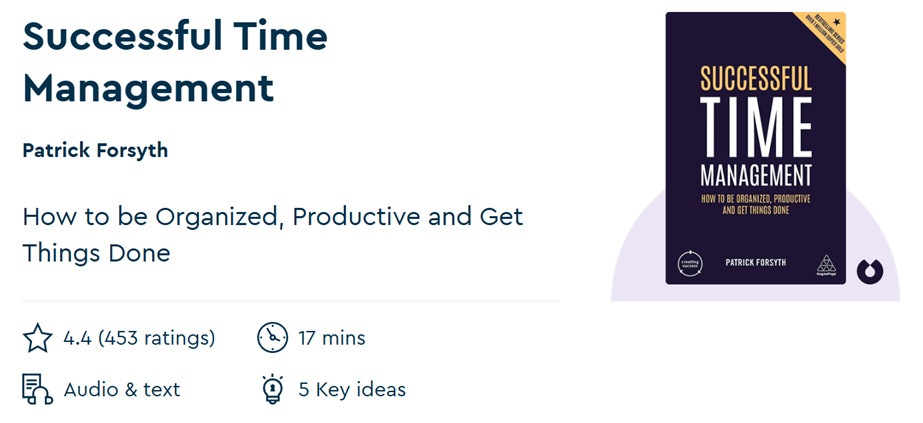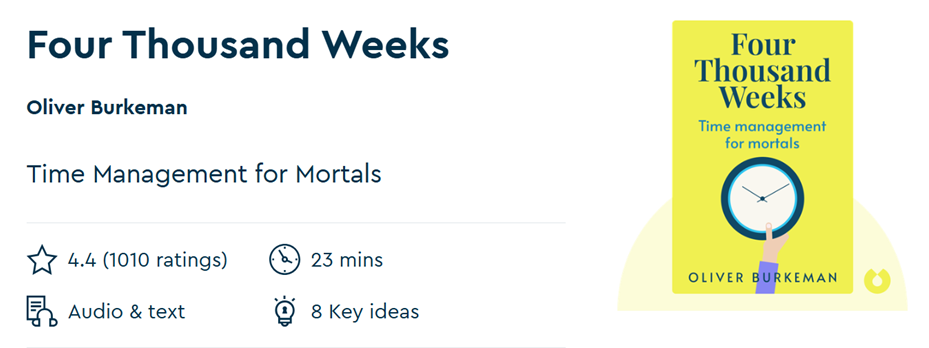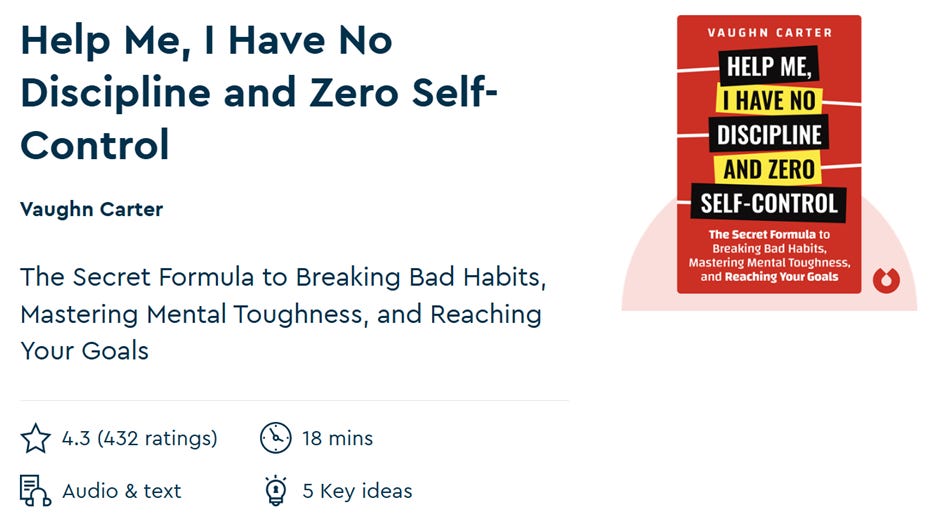PhD Productivity Hacks: Lessons from Blinkist (Part I)
Mastering Time and Focus
For the past six months, I've been regularly listening to podcasts on Blinkist. If you haven’t heard of it, Blinkist is a platform that summarizes thousands of books into digestible key insights. Now, before any book lovers raise an eyebrow—I promise, this hasn’t replaced my love for reading full-length books. Instead, Blinkist has become a way to absorb valuable concepts in the midst of a busy life. I listen while doing the dishes, commuting to the lab, or even while pipetting repetitively during an experiment. It keeps me company and helps me internalize ideas that, in turn, help me navigate my day more effectively.
If you're curious about how Blinkist compares to other platforms, you might find this breakdown interesting, Shortform vs. Headway vs. Blinkist (2025): Which is The Best Book Summary App? by Julio Froment.
The books I listen to are mostly in the realm of personal development, so in many ways, they feel like motivational podcasts distilled into their key points. And when a book truly resonates, I go ahead and read the full version. I see it as an enhancement to my daily routine rather than a replacement for traditional reading.
That’s why today, I want to share some of the best Blinkist summaries that have genuinely transformed my perspective—especially regarding my PhD. I've implemented techniques from these books, and they’ve worked. They focus on productivity, time optimization, and mindset shifts—concepts backed by extensive research that I had no clue about before.
I’ve decided to break this into three separate posts to give each topic the attention it deserves. The next installment will be out next Sunday!
TIME MANAGEMENT
Blinkist recommendations: Successful Time Management by Patrick Forsyth / Four Thousand Weeks by Oliver Burkeman
Successful Time Management by Patrick Forsyth provides tools to enhance productivity through structured time management. The core framework includes four steps: planning, execution, monitoring, and communication. One key method, LEAD, helps structure tasks:
L (Listing Activities) – Write down tasks
E (Estimating Time) – Assign realistic time estimates
A (Allowing Contingency Time) – Buffer for unexpected events
D (Deciding Priorities) – Rank tasks by importance
The book also emphasizes eliminating distractions, learning to say no, optimizing meetings, and applying the 80-20 principle (focusing on the 20% of work that yields 80% of results). Effective collaboration and delegation are also essential to maximize output without burnout.
How I applied this to my PhD: Managing time effectively in a PhD is crucial when juggling experiments, writing, reading, and meetings. The LEAD method helps structure tasks so that time isn’t wasted on low-impact activities. The 80-20 rule is particularly valuable—focusing on experiments and writing papers rather than getting stuck in minor details. Learning to say no to unnecessary meetings or extra commitments safeguards time for high-priority work. Breaking work into SMART objectives (specific, measurable, achievable, relevant, time-bound) keeps motivation high, while clear communication with supervisors and colleagues minimizes misunderstandings and unnecessary revisions.
Four Thousand Weeks by Oliver Burkeman takes a different approach—it argues that our obsession with productivity is often counterproductive. Instead of constantly striving to “master” time, we should accept its limits and focus on what truly matters. Burkeman explains that modern perceptions of time are shaped by capitalism, which treats time as a resource to be optimized. He draws from Heidegger’s philosophy, which suggests that authentic living means accepting that every choice comes with trade-offs.
Key takeaways:
Being a strategic procrastinator: Not everything is urgent. Choosing what to delay can help focus on what truly matters.
Prioritizing a few meaningful tasks rather than spreading attention too thin.
Learning to say no and setting realistic expectations.
Avoiding digital distractions and the pressure to always “maximize” time.
Adopting a cosmic insignificance therapy mindset: We don’t need to leave an extraordinary mark on the universe to live a meaningful life.
How I applied this to my PhD: The pressure to “do it all” in a PhD can be overwhelming. Accepting that not everything has equal importance helps clarify priorities. Not every experiment or paper will be a game-changer, and that’s okay. Being a strategic procrastinator—choosing what to delay—lets me focus on high-impact work. Reducing distractions and unrealistic expectations makes productivity more sustainable. And finally, embracing cosmic insignificance therapy helps keep things in perspective: my PhD is important, but it doesn’t define my entire worth, and it’s okay to have unproductive days.
Finding the right balance between these two approaches isn't easy, but for me, it's the key to mental serenity.
DISCIPLINE AND SELF-CONTROL
Blinkist recommendation: Help Me, I Have Zero Discipline and No Self-Control by Vaughn Carter
This book offers practical strategies to build self-discipline and overcome procrastination. It views willpower as a muscle—it gets fatigued with overuse but can also be trained. The brain’s ability to stay disciplined is influenced by stress, sleep, and diet, so optimizing these factors boosts self-control.
Key strategies include:
If-then planning: Creating rules like “If I feel like procrastinating, I’ll work for 10 more minutes first.”
Growth mindset: Seeing failures as opportunities to improve.
Eisenhower matrix: Sorting tasks by urgency and importance (I wrote about it here Time Management in a PhD).
Digital minimalism: Reducing distractions from social media and notifications.
Habit stacking: Attaching new habits to existing ones to make them stick (I wrote about it here Habit Stacking and Habit Tracking: Powerful Tools for Grad School).
Accepting fluctuations in motivation rather than expecting perfection.
How I applied this to my PhD: Self-discipline is crucial when working independently. Creating structured routines has helped me stay consistent without burning out. If-then planning prevents procrastination—setting small, non-negotiable commitments ensures I get started even when I don’t feel like it. The growth mindset reframes mistakes as learning opportunities rather than failures. Digital minimalism helps me stay focused by muting unnecessary distractions. Using the Eisenhower matrix keeps me from spending too much time on minor tasks instead of the most critical ones. Most importantly, I’ve embraced that a PhD is a marathon, not a sprint—there will be days when motivation dips, and that’s normal.
That’s it for this week! The next part will be out next Sunday, where I’ll share more insights that have transformed my approach to the PhD. Let me know in the comments if any of these resonated with you!
Thanks for reading,
Best,
LoA





I never heard of Blinkist...I think that I would be practicing a lot of great ideas that share with us. Thanks.
That’s very helpful!